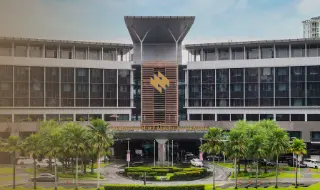What is breast oncoplastic and reconstructive surgery?
Breast oncoplastic and reconstructive surgery is a subspecialty of breast surgery that combines the techniques of breast cancer oncology surgery with breast plastic surgery. The goal is to remove cancer while minimising physical disfigurement caused by surgery, with or without partial or full breast reconstructions.
The aim is to safely remove breast cancer and maintain a woman’s femininity, as survivorship focuses on improving quality of life beyond breast cancer.
Why Should You Choose Prince Court’s Breast Centre?
Evidence based multidisciplinary and multiprofessional care
Prince Court’s Breast Centre is a comprehensive facility where a multidisciplinary and multi-professional team collaborates to provide integrated care for breast cancer patients and endocrine conditions.
At Prince Court, breast cancer patients are treated by a dedicated team of specialists, including radiologists, nuclear radiologists, pathologists, oncologists, plastic surgeons, psychiatrists, and anaesthetists.
We also work closely with clinical genetic counsellors from Cancer Research Malaysia to support breast cancer patients with genetic mutations and individuals at high risk of developing breast cancer due to family history of breast and/or ovarian cancers.
Advanced Technology
3D Mammogram (Tomosynthesis) - This advanced imaging technique enhances the detection and characterisation of breast abnormalities, particularly in women aged 40-50 with dense breast tissue (lower fat composition), helping to avoid unnecessary biopsies.
Siemens Healthineers Biograph Vision 450 PET/CT - This cutting-edge technology combines positron emission tomography (PET) and computed tomography (CT) to improve clarity in images for tumour detection and cancer staging.
INTRABEAM Intraoperative Radiation Therapy (IORT) - For some breast cancer patients, the cancer can be removed through a lumpectomy or wide local excision, followed by radiotherapy. In some cases, radiotherapy is delivered during breast cancer surgery itself, a procedure known as intraoperative radiotherapy.
Intraoperative Frozen section – This service assists surgeons in reducing the need for multiple surgeries.
What services does our breast oncoplastic and reconstructive surgeon provide?
Day-Case, Clinic Based Breast Procedures
Breast radiologists and surgeons can perform the following procedures as a day cases under local anaesthetics:
- Biopsy of breast lesions or lumps
- Aspiration of breast cysts or abscess
- Incision and drainage of abscess
Breast Benign Condition Surgery
- Breast lump excisions examples include fibroadenoma, lipoma, and sebaceous cyst and etc.
Breast Cancer Surgery
Breast conserving surgery (BCS)
- Simple wide local excision (WLE)
- Wire guided or imaged guided wide local excision
- Breast Oncoplastic Level I Surgery - Removing breast cancer and filling the gap with surrounding breast tissue to reduce the risk of defects, using a modified Benelli round block technique.
- Breast Oncoplastic Level II Surgery:
Therapeutic mammoplasty - This procedure removes breast cancer, reduces breast size, and uplifts the breast simultaneously. Various types, such as:
- Lejour or Vertical Mammoplasty
- Wise Pattern Mammoplasty
- Lateral Mammoplasty
- J-Mammoplasty
- Racquet Mammoplasty
- Grisotti Technique
- Batwing Mammoplasty
- Breast Oncoplastic Level III Surgery:
Partial mastectomy and partial breast reconstruction with chest wall perforator flaps - Oncoplastic and reconstructive surgery can help patients avoid mastectomy even when the cancer is large. Chest wall perforator flaps restore breast size by using nearby chest fat and its blood supply. Options include:
- Anterior Intercostal Artery Perforator (AICAP) Flap
- Middle Intercostal Artery Perforator (MICAP) Flap
- Lateral Intercostal Artery Perforator (LICAP) Flap
Mastectomy
Removal of breast is also known as mastectomy. Types of mastectomies include:
- Simple mastectomy - Breast removal along with nipple and areolar complex.
- Skin sparing mastectomy +/- Nipple sparing - Ideal for immediate breast reconstruction in patients with small or medium-sized breasts, where the nipple can be preserved safely if no cancer is found behind it.
- Skin reducing mastectomy +/- Nipple sparing - Suitable for immediate breast reconstruction in patients with large, drooping (ptotic) breasts, preserving the nipple if no cancer is detected behind it.
- “Goldilocks” mastectomy +/- Nipple sparing – Suitable for women with large drooping (ptotic) breast, it is performed after a mastectomy to remove unhealthy breast tissue. Then, the remaining fatty tissue and skin are formed to mould like a breast.
Axillary Surgery:
- Axillary node biopsy
- Sentinel lymph node biopsy with or without frozen section
- Sentinel lymph node sampling
- Targeted axillary node biopsy
- Axillary node clearance
Nipple Related Surgery
- Microdochectomy
- Total duct excision or Hadfield surgery
- Nipple reconstruction
- Nipple reduction
Preventive Breast Surgery for High-Risk Patients
Patients at high risk of developing breast cancer due to genetic mutations or family history, but without a current breast cancer diagnosis, may consider preventive surgery, such as risk-reducing mastectomies with or without reconstruction. Risk-reducing mastectomies have been shown to lower breast cancer risk by approximately 90-95%. This decision should involve comprehensive consultations to discuss the risks and benefits of preventive surgeries.
Breast Cosmetic or Revisional Surgery
Patients with a history of breast cancer-related surgeries, breast reconstruction surgeries, or other cosmetic breast procedures who are concerned about the appearance of their breasts may benefit from an assessment by an oncoplastic and reconstructive breast surgeon or a plastic surgeon. They can propose further surgical interventions to improve the appearance of the breasts. Often, breast investigations are required before any revisional or additional cosmetic breast surgeries. These procedures are available often offered with our own plastic surgeon to address cosmetic or structural concerns post-treatment or following previous surgeries and may include:
- Removal and/or replacement of breast implants
- Excision of silicone granulomas or mastectomy with or without partial or full breast reconstruction
- Breast reduction and uplift surgery (mammoplasty)
- Breast uplift surgery (mastopexy)
- Breast enlargement or augmentation with breast implants or auto-augmentation with chest wall perforator flaps
- Breast enlargement or correction of defects with lipomodelling



















